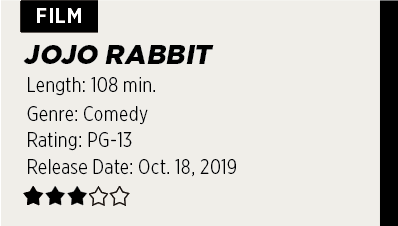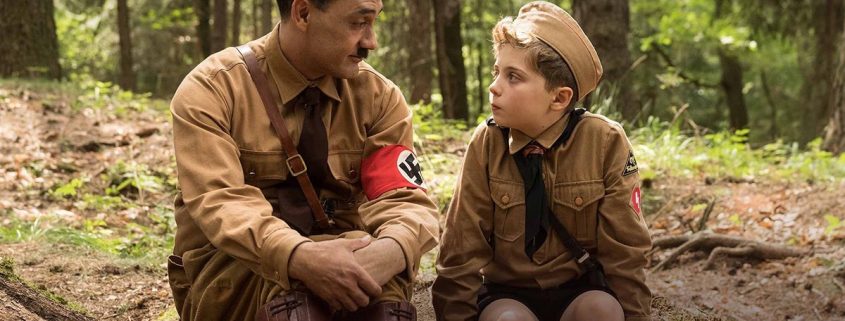REVIEW: ‘Jojo’ presents a moving plot with strong, relatable themes

Most children worship celebrities, actors, artists or even activists. Ten-year-old Johannes Betzler, however, worships Adolf Hitler — an idol not unheard of for children in 1940s Nazi Germany. Raised in a small German town, he attends a Nazi education camp, learning how to become a good soldier for Hitler’s army.
The latest film from Taika Waititi (best known for directing “Thor: Ragnarok”), “Jojo Rabbit” opens to the life of a typical German schoolchild — well, as typical as attending a Nazi-era summer training camp can be. Instead of playing with toys, learning how to make friendship bracelets or canoeing in the river, the children burn books, throw knives and talk about killing European soldiers.
“Jojo Rabbit” portrays this as normalized behavior in the 1940s, satirically changing the historically vicious German army leaders into role models for the German children. It’s an ambitious but subtly strong concept — few have merged historical tragedies with high school comedy tropes. The most popular example would be Roberto Benigni’s “Life is Beautiful” in 1997.
Johannes, the film’s protagonist, is given the unfortunate nickname “Jojo Rabbit” — not as an endearing term but for his inability to kill a rabbit and prove his cold-hearted Nazi strength. Luckily for Jojo, he has an imaginary friend who takes the form of Hitler, accompanying him, guiding him and cheering him up along the way. A sort-of-motivational speaker, director Waititi, who plays Hitler, embodies himself as a hilariously whimsical, mocking vision of the genocidal Nazi leader. Waititi brings a positive energy, one that would not be seen from the eyes of most but would make sense given Johannes’ perspective.
The movie takes a dark turn as Jojo discovers that his mother is hiding Elsa, a Jewish girl, in their house. Even though the film begins with a lighter tone — under the guise of a typical coming-of-age story — the realities of the Nazi regime begin to eclipse the family, ushering a heavier atmosphere into the story. The dangers of hiding a Jewish person rarely need to be explained; Jojo must find a way to balance his new discovery with the teachings of the Nazi regime. Waititi does not sugarcoat anything, as the audience is quickly forced into reality, realizing that Johannes’ childhood is quickly over. In one turning point, Waititi effectively destroys Johannes’ childhood, symbolizing the effects of war and violence on children. Teasing and humanizing Hitler is no longer the main theme of the film.
There are romantic moments between Elsa and Johannes, but in the end, she becomes the mother that Johannes lost. He kicks away his reliance on imaginary Hitler and the loyalty and tribalism that he represents. Waititi attempts to intersect aspects of a teenager’s growth with the most dangerous part of the world in a truly “outcast vs. the world” situation. While this is mostly played for laughs, Waititi’s message (though it may be a tried-and-true “love conquers all” conclusion) is effectively portrayed.
The initially sweet scenes in the film quickly become despondent as Waititi unloads one tragedy after another. Continually losing the most important aspects of his life — his ability to serve, his mother and his loyalty — should have crushed him long ago, yet he still stands. Johannes’ bravery stands for much more than just emotional growth. It represents his iron will and persistence, despite the destruction of his normal childhood.
Ironically, Waititi has input the very essence of the American dream into Jojo’s character, making him the beacon of American values like love and friendship in a world of Nazi rule. The events may be exaggerated, but the message definitely is not. He’s the representation of the nerdy outcast that many have identified with in their childhoods, making his situation something that many can sympathize with and, consequently, learn from.


